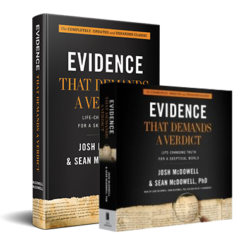
The Pentateuch, attributed to Moses, includes the first five books of the Old Testament. It is a core text for three world religions and the foundation of the Christian Bible and the Jewish Scriptures.
So it matters that the texts be viewed with authority. It is through these books, long believed to have been revealed by God and recorded by Moses, that we learn the origins of humanity, as well as man’s purpose and destiny. Genesis, Exodus, Leviticus, Numbers, and Deuteronomy give us an overview of God’s plan of redemption. And these five historical books provide the foundation for everything else that follows in Scripture.
Though modern skeptics challenge that Moses wrote the books (some even doubt he existed), there is plenty of evidence throughout the Bible, as well as external texts, to give us confidence that he did. Old Testament and New Testament references clearly and consistently testify to Mosaic authorship, authority, and influence.
Moses a Reliable Source?
The books certainly do not herald Moses‘ future as prophet, priest, and leader. Rather, the picture we are given is Moses as an anti-hero — a murderer and outlaw who, as he spoke with God at the burning bush, requested THIRTEEN times that God find someone else to lead the Israelites to freedom!
Who would invent such a hero as the founder of a nation? God — who always knows what He’s doing when he picks a person to achieve His plans.
Moses quickly grew into a strong, yet humble leader who kept the spotlight on God. As both an Israelite and former member of Pharaoh’s household, Moses had an insider’s knowledge and understanding of the Egyptian court. This was but one tool God gave Moses for his interactions with Pharaoh. Imagine that ultimate showdown: one man who believed he was a god (Pharaoh) being shown by God that He, alone, holds the title.
Biblical Evidence for Moses’ Authorship
Technically, the Pentateuch, also known in Hebrew as the Torah, is anonymous. But it specifically records God commanding Moses to preserve received revelation. There are both Old and New Testament references to Moses that validate that Moses did write them. Even Jesus and His disciples acknowledged a significant connection between Moses and the Torah, and Jesus frequently referred to these books as being Moses’ teachings.
Examples of the Old Testament references to Moses:
Exodus 17:14: Then the Lord said to Moses, “Write this as a memorial in a book and recite it in the ears of Joshua, that I will utterly blot out the memory of Amalek from under heaven.
Exodus 24:4: And Moses wrote down all the words of the Lord
Exodus 34:27: And the Lord said to Moses, “Write these words, for in accordance wit these words I have made a covenant with you and with Israel.
Numbers 33:2: Moses wrote down their starting places, stage by stage, by command of the Lord, and these are their stages according to their starting places
Deuteronomy 31:24-26: When Moses had finished writing the words of this law in a book to the very end, Moses commanded the Levites who carried the ark of the covenant of the Lord, “Take this Book of the Law and put it by the side of the ark of the covenant of the Lord your God, that it may be there for a witness against you.”
Examples of testimony to Moses’ role in lawgiving woven throughout the Old Testament:
Joshua 1:7,8 and 23:6: “Only be strong and very courageous, being careful to do according to all the law that Moses my servant commanded you. This Book of the Law shall not depart from your mouth, but you shall meditate on it day and night, so that you may be careful to do all that is written in it.
1 Kings 2:3: (King David, on his deathbed, giving final instructions to his son, Solomon): “Keep the charge of the Lord your God, walking in His ways and keeping His statutes, His commandments, His rules, and His testimonies, as it is written in the Law of Moses, that you may prosper in all that you do and wherever you turn.
2 Chronicles 17:9: “And they taught in Judah, having the Book of the Law of the Lord with them. They went about through all the cities of Judah and taught among the people.
2 Chronicles 23:18: “And Jehoiada posted watchmen for the house of the Lord under the direction of the Levitical priests and the Levites whom David has organized to be in charge of the house of the Lord, to offer burnt offerings to the Lord, as it is written in the Law of Moses, with rejoicing and with singing, according to the order of David.”
Daniel 9:11,13: “All Israel has transgressed your law and turned aside…And the curse and oath that are written in the Law of Moses the servant of God have been poured out upon us, because we have sinned against Him. … As it is written in the Law of Moses, all this calamity has come upon us.
Malachi 4:4: “Remember the law of my servant Moses, the statutes and rules that I commanded Him at Horeb for all Israel.”
Examples of New Testament References to the Law of Moses:
The New Testament also speaks of Moses’ significant involvement in the Pentateuch’s composition. Jesus often quoted Scripture traditionally attributed to Moses. In John 5:46, Jesus states, “For if you believed Moses, you would believe Me; for he wrote of Me.” And in Mark 12:26, Jesus says, “And as for the dead being raised, have you not read in the book of Moses, in the passages about the bush, how God spoke to him, saying, ‘I am the God of Abraham, and the God of Isaac, and the God of Jacob’?” After His resurrection, Jesus gave additional authority to these books when He taught the two who walked with Him to Emmaus how the writings pointed to and were fulfilled in Him.
The disciple Peter spoke of Moses’ Authority in Acts 3:22: Moses said, “The Lord God will raise up for you a prophet like me from your brothers. You shall listen to him in whatever he tells you.”
James spoke of Moses’ influence in Acts 15:21: “For from ancient generations Moses has had in every city those who proclaim him, for he is read every Sabbath in the synagogues.”
The Sadducees also spoke of Moses’ Authorship in Mark 12:19: “Teacher, Moses wrote for us that if a man’s brother dies and leaves a wife, but leaves no child, the man must take the widow and raise up offspring for his brother.”
Granted, none of this proves Moses was involved in writing the Pentateuch. But simply put, creation, human history, and the patriarchal period cannot be properly understood if not viewed in the life and work of Moses. Much of the Pentateuch, in fact, reads as Moses’ biography or perhaps autobiography.
Trusting the Reliability of the Bible
Until the 18th century AD, Moses’ authorship of the Pentateuch was largely unchallenged. But that’s not to say that anomalies did not go unnoticed. For example, could Moses have described his own death in Deuteronomy 34? While it’s possible that Moses received and recorded this by prophesy prior to his death, most scholars view this information to be an addendum by a later editor.
Moses may or may not be the single author of the Pentateuch. But he is decidedly the authority from which the Pentateuch emanated. The meaning, theology, and even history portrayed adequately reflect what Moses did say, pray, or sing. There is no reason to doubt Moses’ authorship of the oral tradition or some of the written records. But it is both possible and expected that revisions and updating occurred throughout its history right up until completion of the final version.
Still, some modern skeptics simply refuse to accept Moses’ role in the Pentateuch, due to lack of definitive evidence. Many have put forth numerous alternate theories about authorship that are quite convoluted. We have to remember that skeptics come with biases. Some deny the validity of the Old Testament. Others discount the supernatural accounts of God’s interventions reported in the Bible. Others bring personal beliefs to their interpretations. It is understandable that these factors shape how each scholar views and interprets the text.
But as the Skeptics Dictionary notes: “We know from experience that more often than not the theory that requires more complicated machinations is wrong.” In other words, the simpler the theory is, the more likely it is to be correct.
The model that remains the simplest explanation for the Pentateuch’s composition is the traditional Jewish and Christian model: Moses as the original author used some sources, and later editor(s) updated the text to ensure it was understandable to contemporary readers.
Given the Bible’s track record of accuracy and reliability, should it not get the benefit of the doubt?

This blog post highlights Josh and Sean McDowell’s recently revised apologetics classic, Evidence That Demands a Verdict. We are certain this fully updated and expanded resource will be an effective evangelism tool for you, and strengthen your faith by answering the toughest questions tossed to you by skeptics. Know what you know, because it’s true. But share this truth with LOVE!
If you’d like to start from the first blog post in this series, click here: Apologetics: Apologizing for Believing in God?.



